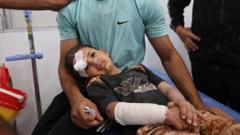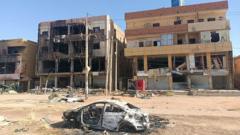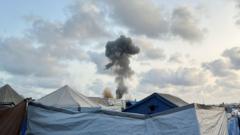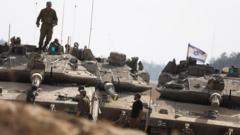The U.S. and Israeli airstrikes aimed at the Houthi militia have exacerbated the humanitarian situation in Yemen, killing civilians and destroying critical infrastructure, leading to growing international concern.
US and Israel's Military Strikes in Yemen: The Dire Human Cost

US and Israel's Military Strikes in Yemen: The Dire Human Cost
Military operations targeting Iranian-backed Houthis trigger severe humanitarian crisis in Yemen, officials warn.
In Yemen’s northwestern Hudaydah Province, tragedy struck on April 17 when Mohammed Omar Baghwi, a civilian working at a port, lost his life during a U.S. military airstrike. Over 74 people were reported killed that day, making it one of the deadliest operations for American forces in Yemen's ongoing conflict. U.S. Central Command justified the airstrike as a measure to diminish the economic power of the Iran-supported Houthi militia, which has increasingly engaged in drone and missile attacks targeting Israel in response to ongoing conflict in the region.
Witnesses and families, however, have expressed frustration and sorrow, emphasizing that many victims like Baghwi were simply trying to earn a living under dire circumstances. “Mohammed and his companions had done nothing wrong,” lamented his brother, Hassan Omar Baghwi.
As tensions mount between Iran and Israel, the Houthis have escalated their military actions, drawing retaliatory airstrikes from both the U.S. and Israel. While these strikes are framed as necessary offensives against militia leaders and resources, they have unfortunately resulted in significant civilian casualties. Reports indicate not only the loss of life but also critical damage to Yemen's already fragile infrastructure, with aid agencies warning that the incessant bombing campaigns are intensifying the humanitarian crisis in this impoverished nation.
Activists and humanitarian organizations are urging for a reassessment of military strategies, highlighting that the civilian toll associated with these operations is increasingly unsustainable and points to a recurring global issue where the consequences of international military campaigns disproportionately affect vulnerable populations.
Witnesses and families, however, have expressed frustration and sorrow, emphasizing that many victims like Baghwi were simply trying to earn a living under dire circumstances. “Mohammed and his companions had done nothing wrong,” lamented his brother, Hassan Omar Baghwi.
As tensions mount between Iran and Israel, the Houthis have escalated their military actions, drawing retaliatory airstrikes from both the U.S. and Israel. While these strikes are framed as necessary offensives against militia leaders and resources, they have unfortunately resulted in significant civilian casualties. Reports indicate not only the loss of life but also critical damage to Yemen's already fragile infrastructure, with aid agencies warning that the incessant bombing campaigns are intensifying the humanitarian crisis in this impoverished nation.
Activists and humanitarian organizations are urging for a reassessment of military strategies, highlighting that the civilian toll associated with these operations is increasingly unsustainable and points to a recurring global issue where the consequences of international military campaigns disproportionately affect vulnerable populations.



















